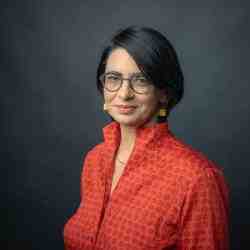Moje téma
Shweta Chari is pioneering the Right to Play movement in India, integrating play-based learning into the country's education system to foster holistic child development.
Co chci změnit
Shweta Chari is at the forefront of the Right to Play movement in India, and creating a foundation for a significant policy shift to embed play-based learning into the educational landscape. Recognizing a significant gap, she identified that while global initiatives increasingly emphasise play for children's development, India lacked both evidence and a concerted approach to incorporating play as a critical developmental tool. In a country where 80% of the population is marginalised, play is often viewed as a luxury, inaccessible to many. Shweta observed that the absence of play contributes to developmental delays and behavioural issues in children. She posited that simply increasing access to play could significantly mitigate these challenges.
Through her initiative, Shweta integrates structured play into formal education, transforming learning environments, especially in government urban and rural schools. By embedding play periods and educational games into curricula, her approach shifts the focus from rote learning to a more engaging, child-centric model, valuing play as a vital part of education.
In 2012, Shweta launched the Play2Learn programmes, focusing on structured play as an essential component of learning. Her initiative emphasises the role of play in developing life skills, enhancing creativity, and improving social interactions, aiming to transition from traditional education to a model that leverages the power of play. Through partnerships with state governments, teacher training programmes, and centres of excellence, Shweta is driving a systemic shift, ensuring that play-based learning becomes a standard in Indian education, particularly for at-risk children.
Shweta’s initiative is leading the field in India by using play as a primary tool for impact. Her efforts aim to educate and empower at-risk children to become well-rounded and contributing citizens. By partnering with government schools and training their teachers, her initiative ensures children have access to quality play, helping them build essential life skills such as communication, critical thinking, and socio-emotional learning through various Play programmes.
Kde vidím problém
India's formal education system inadequately emphasises play, particularly structured play activities that are essential for holistic child development. While some play-based schools exist, the broader system often fails to integrate these methods, especially as children transition to formal education. Vulnerable communities, in particular, have little to no access to play-oriented learning from the start, which is crucial for cognitive, social-emotional, and overall development. In the early years of a child’s life, play is essential for cognitive development, social-emotional skills, and creating a positive mindset towards education and life.
According to a study by the National Council of Educational Research and Training (NCERT), only 34% of schools in India have a playground or space for outdoor activities. A survey by the Annual Status of Education Report (ASER) revealed that in 2018, only 64.3% had any play or sports equipment for students, and the same study revealed that only 27.8% of schools had a dedicated period for play or physical activities in their daily schedule. Furthermore, a study by the Centre for Civil Society found that in 2016, 75% of parents felt that their child’s school did not provide enough opportunities for play and physical activity. The lack of play in the education system, coupled with the societal perception of play as unproductive, hampers children's development, limiting opportunities for critical thinking, problem-solving, and overall engagement in learning.
As children transition to formal schooling, the focus shifts more towards academics, leaving little room for play and interactive activities. The lack of play in the lives of children in the Indian education system, as well as looking at play as a waste of time in general, can have several consequences, such as hindering their overall growth and development, reducing opportunities for developing critical thinking and problem-solving skills, and creating a less engaging and interactive learning environment, which can lead to lower motivation and interest in learning.
Jak to změním
In response to this need that children need more structured play, Shweta developed the Play2Learn programmes in 2012, integrating play into the educational framework by categorising and codifying games into accessible formats. A significant milestone was achieved in 2016 when the Maharashtra government saw evidence of increased attendance, a decrease in dropout rates, and better learning outcomes thus inviting her to integrate her Play2Learn programmes into its Mahaparivartan initiative, mandating an hour of play daily for children in grades 1 to 8 in rural government schools, transforming play from an optional activity into a crucial part of the curriculum. The objective was to ensure that play was perceived as an enjoyable and integral part of the school curriculum, rather than another lesson.
Shweta’s approach views play as integral to learning, crucial for developing 21st-century skills, enhancing creativity, and fostering social interactions. Her suite of interconnected programmes includes Play2Learn, which offers quality free-play for children aged 3-14; Shweta’s Conscious Play™ approach, focusing on cultivating critical thinking and socio-emotional skills through structured play; and the Play Practitioner programme, which trains teachers to become skilled Playful Facilitators. Together, these programmes create a comprehensive Life Skills Play Programmes that supports both free and structured play, facilitated by trained educators.
Over the years, TOFs Life Skills Play Programmes have created tremendous impact on children’s behavioural outcomes and skills, with a study in 2017 that showed notable improvements in behavioural characteristics among children in Mumbai’s Malvani slums, including a tenfold increase in curiosity and a fivefold increase in honesty. By honesty, Shweta talks about the student-teacher bond, with children feeling safe to take ownership of their actions - accepting mistakes, taking queries to teachers without hesitation, trusting peers and teachers.
Another study conducted in TOF’s pre-primary classrooms showed that regular access to TOF’s play programmes led to a 24% increase in social and emotional skills, a 26% rise in life skills, and a 34% improvement in motor skills.
In 2023-24 TOF conducted another assessment to measure the impact of its Life Skills Play Programmes on children’s Critical Thinking and Communication skills. This was a play-based assessment for children between 6-14 years of age that ensured their children’s individual thinking and agency were accounted for. The results showed a 52% improvement in Critical Thinking, 53% increase in Listening skills, 82% improvement in their ability to interact respectfully, and 88% increase in Collaboration.
Teacher training is a cornerstone of Shweta’s strategy. Through the 2-day ‘Transformative Power of Play’ workshops designed for teachers to develop necessary skills, attitudes, and knowledge needed to be expert playful facilitators, empowering them to bring more play-oriented practices to their classrooms and communities. Over 7,500 teachers have been empowered to bring play into their classrooms, with the support of TOF’s Outreach Play Workers and a volunteer network. Shweta and her team have also noticed a massive impact on the lives of teachers, with teachers becoming more curious, playful, and joyful. This has enabled teachers to enhance their bond with the students leading to more expressive classrooms, facilitating learning without fear, and engaging in productive conversations, equipping them with the skills to develop life skills in their children adding a bigger sense of purpose to their work as teachers.
Even during the COVID-19 lockdown, Shweta transitioned her pedagogy online, extending her reach across six states in India. Currently, The Opentree Foundation operates over 600 Play2Learn centres, training close to 14,000 teachers and directly impacting around 150,000 children. By 2026-2027, Shweta aims to reach 500,000 children and train 50,000 teachers, scaling her impact across India.
Shweta also collaborates with international experts to contextualise play-based learning tools for India.
Additionally, Shweta is launching Play Labs, smaller groups for easier monitoring and evaluation, in collaboration with major academic institutions, to generate research on play-based learning outcomes through a longitudinal study.
The vision is for play to become a fundamental solution for teachers to address challenging behaviours in classrooms, ensuring every child can experience the transformative power of play. With an advocacy framework in place, Shweta is set to launch the ‘Play Research and Action Institute of India’ focusing on mainstreaming Play, and in another conversation with a renowned academic institute, Shweta is also working to develop a curriculum for a Masters programme in Play Work
Kdo jsem
As a 21-year-old engineering graduate, Shweta Chari began volunteering as a Math teacher at a home for at-risk children. There, she observed how play could alleviate the burdens of academic demands, sparking a transformation in the children’s learning experience.
Regular play improved their emotional well-being, self-confidence, and learning outcomes, inspiring Shweta to ensure every child experiences a beautiful childhood and has the Right to Play.
As the children began playing regularly, Shweta realised that play could significantly improve their emotional and mental well-being, boost their self-confidence and learning outcomes, and enable children to grow into well-rounded, emotionally stable individuals who could solve problems and navigate challenges more effectively.
Witnessing this profound impact inspired her to develop her core idea: to ensure that every child has the Right to Play and that play becomes a fundamental part of every child’s life.
In 2004, while working a corporate job to earn an income, Shweta founded Toybank – Development through Play, informally starting it on weekends. The idea was born from the belief that through toys and games, children can rediscover their playful selves, simply be kids, and learn better. Between 2004 and 2009, while holding a full time corporate job, she ran the Toybank project as a volunteer effort, building a large network of friends and credible supporters. This period helped her realise her purpose: to ensure more children experience the joys of play. At first, Toybank distributed ethical toys and games to over 100,000 children across various cities in India, but faced challenges with educational games that required facilitation due to language barriers or complexity. In 2009, she formalised this mission by registering The Opentree Foundation, driven by a deep-seated desire to ensure no child feels abandoned or unloved.
This led to the development of the Play2Learn programmes, focusing on providing children with curated play material and training teachers to use games and play-oriented practices in the holistic development of children in India.
Shweta's journey from volunteer to visionary leader reflects her deep commitment to transforming education through play, ensuring that every child experiences the joy and developmental benefits that come with the Right to Play.




